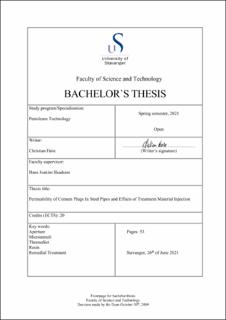| dc.contributor.advisor | Skadsem, Hans Joakim | |
| dc.contributor.author | Høie, Christian | |
| dc.date.accessioned | 2021-09-07T16:31:40Z | |
| dc.date.available | 2021-09-07T16:31:40Z | |
| dc.date.issued | 2021 | |
| dc.identifier | no.uis:inspera:78834598:34115859 | |
| dc.identifier.uri | https://hdl.handle.net/11250/2774464 | |
| dc.description.abstract | Wellbore integrity is a common challenge in the oil and gas industry. Despite all measures in place, the integrity is often threatened. The integrity of the well is dependent on zonal isolation, effort is made to ensure that there is no fluid migration possible. However, sustained casing pressure is a common problem in the industry.
Poor primary cement jobs are often the culprit of well integrity issues. A poor primary cement job requires additional cementing work, remedial cementing. The traditional method of remedial cementing is squeeze cementing, often using ordinary Portland cement. However, success rates are often low as the slurry is unable to penetrate the relevant apertures due to the particle size. Alternative remedial materials have thus been developed, such as Wellcem’s ThermaSet.
This thesis studied the permeability of cement plugs cast in steel casings and the effects of treatment material injection in an attempt to reduce the permeability, which was higher than what is considered for bulk cement due to leakage pathways. Five steel casings were filled with API Neat class G cement, the samples were leakage tested to establish the permeability. At the conclusion of the permeability measurements, the samples were subject to lab-scale treatment experiments using two different recipes of ThermaSet. The permeability measurements before and after the treatment was compared. Three out of five samples experienced a reduction in permeability. | |
| dc.description.abstract | Wellbore integrity is a common challenge in the oil and gas industry. Despite all measures in place, the integrity is often threatened. The integrity of the well is dependent on zonal isolation, effort is made to ensure that there is no fluid migration possible. However, sustained casing pressure is a common problem in the industry.
Poor primary cement jobs are often the culprit of well integrity issues. A poor primary cement job requires additional cementing work, remedial cementing. The traditional method of remedial cementing is squeeze cementing, often using ordinary Portland cement. However, success rates are often low as the slurry is unable to penetrate the relevant apertures due to the particle size. Alternative remedial materials have thus been developed, such as Wellcem’s ThermaSet.
This thesis studied the permeability of cement plugs cast in steel casings and the effects of treatment material injection in an attempt to reduce the permeability, which was higher than what is considered for bulk cement due to leakage pathways. Five steel casings were filled with API Neat class G cement, the samples were leakage tested to establish the permeability. At the conclusion of the permeability measurements, the samples were subject to lab-scale treatment experiments using two different recipes of ThermaSet. The permeability measurements before and after the treatment was compared. Three out of five samples experienced a reduction in permeability. | |
| dc.language | eng | |
| dc.publisher | uis | |
| dc.title | Permeability of Cement Plugs In Steel Pipes and Effects of Treatment Material Injection | |
| dc.type | Bachelor thesis | |
